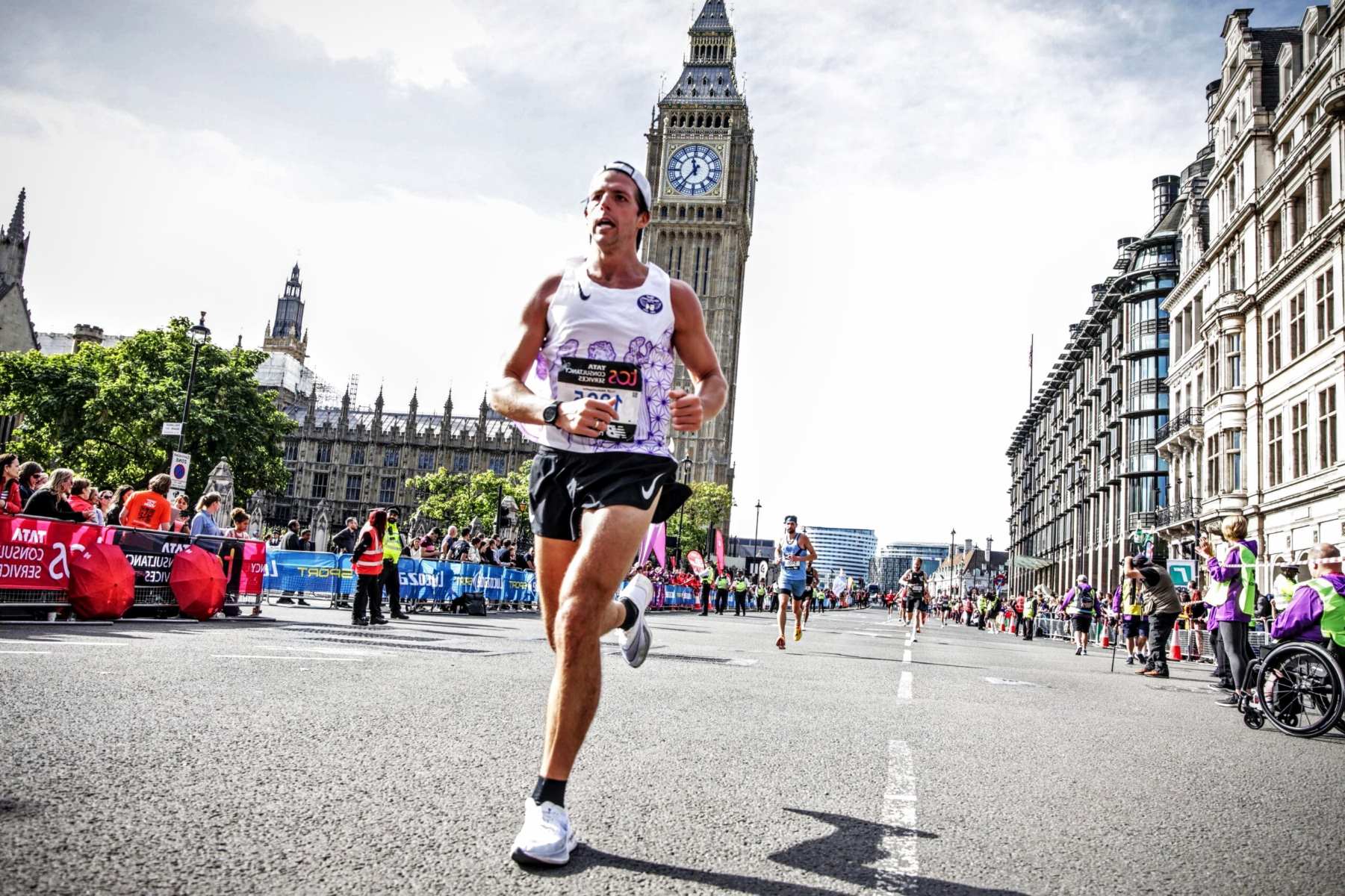Home>Training & Techniques>Avoid These 10 Major Marathon Mistakes For A Successful Run


Training & Techniques
Avoid These 10 Major Marathon Mistakes For A Successful Run
Published: March 1, 2024
Avoid these 10 major marathon mistakes and learn essential training & techniques for a successful run. Find expert tips to optimize your marathon preparation.
(Many of the links in this article redirect to a specific reviewed product. Your purchase of these products through affiliate links helps to generate commission for Therunningadvisor.com, at no extra cost. Learn more)
Table of Contents
Introduction
Marathons are the ultimate test of physical and mental endurance, attracting thousands of participants each year. Whether you're a seasoned runner or a first-time marathoner, the journey to the finish line is filled with challenges and triumphs. However, success in a marathon is not solely determined by physical fitness; it also hinges on strategic planning and meticulous preparation. In this article, we will explore the common pitfalls that can hinder your marathon performance and provide valuable insights on how to avoid them. By steering clear of these major marathon mistakes, you can set yourself up for a successful and fulfilling run.
Preparing for a marathon involves more than just logging miles and increasing your endurance. It requires a holistic approach that encompasses training, nutrition, mental fortitude, and race day tactics. Each aspect plays a crucial role in determining your performance and overall experience during the marathon. As such, understanding the potential pitfalls and taking proactive measures to mitigate them is essential for achieving your desired outcome.
In the following sections, we will delve into the key areas where runners often falter, leading to suboptimal race experiences. From inadequate training and neglecting nutrition to overlooking mental preparation and race day planning, these missteps can significantly impact your marathon performance. By addressing these challenges head-on and equipping yourself with the right knowledge and strategies, you can enhance your chances of crossing the finish line with a sense of accomplishment and pride.
Embarking on a marathon journey is a transformative experience that demands dedication, perseverance, and a willingness to confront obstacles along the way. By recognizing the potential pitfalls and learning how to sidestep them, you can approach your marathon with confidence and readiness. So, lace up your running shoes, embrace the exhilarating challenge that lies ahead, and let's navigate the path to a successful marathon together.
Not Training Properly
In the realm of marathon preparation, training serves as the cornerstone of success. Yet, many runners fall into the trap of inadequate or improper training, which can significantly compromise their performance on race day. Not training properly encompasses a range of missteps, from insufficient mileage and lack of variety in workouts to neglecting strength training and ignoring rest days.
One of the most prevalent mistakes is failing to build a solid base of mileage. Without a gradual and structured increase in weekly mileage, the body may not adapt sufficiently to the demands of a marathon. This can lead to fatigue, increased risk of injury, and diminished endurance during the race. Additionally, overlooking the importance of incorporating long runs into training can hinder the body's ability to acclimate to sustained periods of exertion, such as those encountered in a marathon.
Furthermore, neglecting speed work and cross-training can impede overall performance. Speed work, including intervals and tempo runs, is instrumental in improving cardiovascular fitness and increasing running efficiency. Similarly, cross-training activities such as cycling, swimming, or strength training can enhance muscular strength, prevent overuse injuries, and promote overall fitness. Failing to integrate these elements into training can limit the body's capacity to withstand the rigors of a marathon.
Another critical aspect of training that is often overlooked is the incorporation of rest and recovery days. Pushing the body incessantly without allowing for adequate rest can lead to burnout, decreased performance, and heightened susceptibility to injuries. Rest days are essential for muscle repair, glycogen replenishment, and overall rejuvenation, all of which are vital for sustained training progress.
To avoid the pitfalls of improper training, it is imperative to follow a well-structured training plan that encompasses gradual mileage buildup, long runs, speed work, cross-training, and adequate rest. Additionally, seeking guidance from experienced coaches or trainers can provide valuable insights into tailoring a training regimen that aligns with individual capabilities and goals.
By recognizing the significance of comprehensive and purposeful training, runners can fortify their physical and mental preparedness for the marathon, thereby enhancing their prospects of a successful and gratifying race experience. Embracing a holistic approach to training, encompassing mileage, variety, and recovery, can empower runners to conquer the challenges of a marathon with confidence and resilience.
Ignoring Nutrition and Hydration
Proper nutrition and hydration are pivotal components of marathon preparation and performance, yet they are frequently overlooked or underestimated by runners. Ignoring the significance of nutrition and hydration can have detrimental effects on both training progress and race day execution.
In the realm of marathon training, fueling the body with the right nutrients is essential for sustaining energy levels, promoting recovery, and optimizing performance. However, many runners fall into the trap of either undereating or making poor dietary choices, both of which can impede training adaptations and hinder overall progress. Insufficient caloric intake can lead to fatigue, decreased endurance, and compromised muscle recovery, ultimately undermining the efficacy of training sessions. Conversely, consuming an imbalanced diet characterized by excessive processed foods, refined sugars, and inadequate micronutrient content can negatively impact energy levels, immune function, and overall well-being.
Hydration, another critical aspect of marathon preparation, is often disregarded or mismanaged. Dehydration can impair physical performance, hinder cognitive function, and elevate the risk of heat-related illnesses, all of which can significantly impede marathon progress. Conversely, overhydration or improper electrolyte balance can lead to hyponatremia, a potentially life-threatening condition characterized by low blood sodium levels. Striking a balance in hydration practices, encompassing adequate fluid intake and electrolyte replenishment, is imperative for sustaining optimal performance and mitigating the risk of adverse health outcomes.
To address the pitfalls of neglecting nutrition and hydration, runners must prioritize a well-rounded and balanced approach to fueling their bodies. This entails consuming a diverse array of nutrient-dense foods, including lean proteins, complex carbohydrates, healthy fats, and an abundance of fruits and vegetables. Additionally, adhering to a structured hydration plan that accounts for individual sweat rates, environmental conditions, and electrolyte needs is crucial for maintaining optimal fluid balance and supporting physiological function.
By acknowledging the pivotal role of nutrition and hydration in marathon preparation, runners can fortify their bodies with the essential resources needed to endure the rigors of training and race day. Embracing a mindful and strategic approach to fueling and hydrating the body can enhance endurance, promote recovery, and bolster overall performance, ultimately paving the way for a successful and fulfilling marathon experience.
Wearing New Gear on Race Day
Embarking on a marathon journey demands meticulous attention to every detail, including the gear worn on race day. Surprisingly, one of the common yet avoidable mistakes that runners make is wearing new gear on race day. While the allure of donning fresh, high-performance apparel and footwear may seem enticing, the potential repercussions of this decision can significantly impact a runner's marathon experience.
New gear, particularly running shoes and apparel, introduces an element of uncertainty and unpredictability. Despite the advanced technology and innovative designs incorporated into modern athletic gear, the transition from familiar, broken-in equipment to new, untested gear can pose a myriad of challenges. Ill-fitting shoes, chafing from unfamiliar apparel, or discomfort caused by untested accessories can swiftly transform the excitement of race day into a battle against avoidable discomfort and distraction.
The primary concern associated with wearing new shoes on race day is the risk of developing blisters, hot spots, or experiencing discomfort due to inadequate support or fit. Running shoes, especially those tailored for long-distance performance, require a break-in period to conform to the unique biomechanics and foot structure of the wearer. Introducing new shoes without allowing for sufficient adaptation and wear can lead to discomfort, pain, and potential injury, thereby undermining the runner's ability to perform optimally.
Similarly, unfamiliar apparel, such as compression garments, socks, or race-specific attire, can introduce unforeseen challenges. The seams, fabric composition, and fit of new apparel may differ from the runner's accustomed gear, potentially leading to chafing, irritation, or discomfort during prolonged periods of exertion. These issues can detract from the mental focus and physical resilience required to navigate the demands of a marathon, ultimately hindering performance and diminishing the overall race experience.
To mitigate the risks associated with wearing new gear on race day, it is imperative for runners to adhere to a cardinal rule: nothing new on race day. This principle underscores the importance of relying on familiar, well-tested gear that has proven its reliability and comfort throughout the training period. By adhering to this principle, runners can minimize the likelihood of encountering unforeseen discomfort, distraction, or performance limitations arising from untested gear.
In essence, the decision to wear new gear on race day should be approached with caution and prudence. While the allure of novelty may be tempting, the potential consequences of introducing untested gear into the marathon equation can far outweigh the perceived benefits. By prioritizing familiarity, comfort, and reliability in their race day attire, runners can optimize their physical and mental readiness, thereby enhancing their prospects of a successful and gratifying marathon experience.
Starting Too Fast
The adrenaline and anticipation of embarking on a marathon journey can evoke a surge of energy and eagerness, compelling runners to charge ahead with fervor and determination. However, succumbing to the allure of starting too fast is a common yet detrimental mistake that can significantly impact a runner's performance and overall race experience.
Launching into a marathon at an excessively swift pace can lead to a cascade of adverse effects that reverberate throughout the entirety of the race. While the initial burst of speed may elicit a sense of invigoration and confidence, it often masks the underlying toll it exacts on the body and mind. Starting too fast expends precious energy reserves at an unsustainable rate, leading to premature fatigue, heightened cardiovascular strain, and an accelerated depletion of glycogen stores. As a result, the body's capacity to maintain a consistent and efficient pace diminishes rapidly, culminating in a pronounced decline in performance and an increased susceptibility to physical and mental exhaustion.
Moreover, the repercussions of commencing the marathon at an overly aggressive pace extend beyond physiological limitations. The psychological impact of realizing an unsustainable pace can instigate feelings of frustration, anxiety, and self-doubt, disrupting the mental fortitude and focus essential for enduring the arduous journey ahead. As the initial surge wanes and the reality of the marathon's formidable distance sets in, the psychological toll of starting too fast becomes increasingly apparent, compounding the challenges faced by the runner.
To avert the pitfalls of initiating the marathon with excessive speed, runners must exercise restraint, discipline, and strategic pacing. Embracing a conservative and measured approach to the early stages of the race allows the body to acclimate gradually to the demands of sustained exertion, conserving vital energy reserves and mitigating the risk of premature fatigue. By adhering to a well-calibrated pacing strategy that aligns with individual capabilities and race objectives, runners can optimize their performance and resilience throughout the entirety of the marathon.
In essence, the decision to resist the temptation of starting too fast is pivotal for cultivating a sustainable and rewarding marathon experience. By prioritizing prudent pacing, runners can harness their physical and mental resources effectively, surmounting the challenges of the marathon with resilience, determination, and unwavering resolve.
Not Having a Race Day Plan
Not having a well-defined race day plan is a critical yet frequently overlooked mistake that can significantly impact a runner's performance and overall marathon experience. The absence of a meticulously crafted strategy tailored to the unique demands of race day can leave runners vulnerable to a host of challenges, ranging from pacing errors and inadequate fueling to mental fatigue and logistical mishaps.
A comprehensive race day plan encompasses a multifaceted approach that addresses key elements such as pacing strategy, fueling and hydration protocols, mental preparation, and logistical considerations. Without a clear roadmap outlining these crucial aspects, runners risk succumbing to the uncertainties and pressures inherent in the marathon environment, potentially compromising their ability to execute their race objectives effectively.
Pacing strategy stands as a cornerstone of a race day plan, guiding runners on how to distribute their effort across the entirety of the marathon. Failing to establish a well-calibrated pacing plan can lead to the perilous scenario of starting too fast, resulting in premature fatigue and diminished performance in the latter stages of the race. Conversely, commencing the marathon at an overly conservative pace may hinder the runner's ability to capitalize on favorable conditions and achieve their full potential. A meticulously crafted pacing strategy that aligns with the runner's fitness level, race goals, and course profile is essential for optimizing performance and resilience throughout the race.
In addition to pacing, fueling and hydration protocols play a pivotal role in a race day plan. Neglecting to outline a structured approach to fueling and hydration can lead to inadequate energy reserves, dehydration, or gastrointestinal distress, all of which can impede performance and undermine the runner's ability to sustain optimal effort. By establishing a comprehensive fueling and hydration plan that accounts for individual nutritional needs, environmental conditions, and race duration, runners can fortify their bodies with the essential resources needed to navigate the demands of the marathon effectively.
Mental preparation is another critical component of a race day plan, encompassing strategies to bolster focus, resilience, and motivation throughout the marathon. Overlooking the importance of mental fortitude and preparedness can leave runners susceptible to negative thought patterns, emotional fatigue, and diminished resolve, all of which can erode performance and detract from the overall race experience. Implementing techniques such as visualization, positive self-talk, and mindfulness can empower runners to confront the inevitable challenges of the marathon with composure and determination.
Furthermore, logistical considerations, including transportation arrangements, pre-race logistics, and post-race recovery plans, are integral facets of a comprehensive race day plan. Failing to address these logistical aspects can introduce unnecessary stress, distractions, and inefficiencies, detracting from the runner's ability to focus on the task at hand and navigate the race day experience seamlessly.
In essence, not having a well-crafted race day plan can leave runners vulnerable to a myriad of challenges that can compromise their performance and overall marathon experience. By developing a comprehensive strategy that encompasses pacing, fueling, mental preparation, and logistical considerations, runners can enhance their readiness and resilience, ultimately optimizing their prospects for a successful and fulfilling marathon experience.
Skipping Mental Preparation
Skipping mental preparation is a critical yet often underestimated mistake that can profoundly impact a runner's performance and overall marathon experience. While physical training undoubtedly plays a pivotal role in marathon readiness, the significance of mental fortitude and preparedness cannot be overstated. Neglecting to cultivate a resilient and focused mindset can leave runners vulnerable to a myriad of psychological challenges that can erode performance and detract from the overall race experience.
Mental preparation encompasses a multifaceted approach that addresses the psychological demands inherent in the marathon journey. It involves cultivating a resilient mindset, honing mental strategies, and fostering a positive and adaptive outlook that empowers runners to confront the rigors of the marathon with composure and determination.
One of the primary consequences of skipping mental preparation is the heightened susceptibility to negative thought patterns and emotional fatigue. The marathon presents a formidable test of endurance, both physical and mental, and the absence of mental preparedness can leave runners vulnerable to self-doubt, anxiety, and emotional fatigue. These psychological hurdles can impede focus, resilience, and decision-making, ultimately undermining the runner's ability to sustain optimal effort and navigate the challenges of the race effectively.
Moreover, the absence of mental preparation can diminish the runner's capacity to cope with adversity and discomfort during the marathon. Endurance events such as marathons invariably entail moments of physical and mental strain, and the ability to confront these challenges with resilience and adaptability is paramount. Without adequate mental preparation, runners may find themselves ill-equipped to navigate the inevitable discomfort and fatigue that accompany the marathon, potentially leading to a decline in performance and an overall diminished race experience.
To mitigate the pitfalls of skipping mental preparation, runners must prioritize the cultivation of mental fortitude and resilience throughout their training and race day preparations. Implementing strategies such as visualization, positive self-talk, and mindfulness can bolster mental preparedness, empowering runners to confront the psychological demands of the marathon with confidence and determination. Additionally, seeking support from mentors, coaches, or mental performance professionals can provide valuable insights and techniques for enhancing mental resilience and focus.
In essence, mental preparation stands as a cornerstone of marathon readiness, wielding a profound influence on a runner's ability to endure and excel in the face of formidable challenges. By recognizing the pivotal role of mental fortitude and preparedness, runners can fortify their psychological resilience, ultimately optimizing their prospects for a successful and fulfilling marathon experience.
Ignoring the Importance of Rest and Recovery
In the pursuit of marathon preparation, the relentless focus on training mileage, speed work, and race day strategies often leads runners to overlook a fundamental yet often underestimated aspect of performance optimization: rest and recovery. Ignoring the importance of rest and recovery can have profound implications for a runner's physical well-being, training adaptations, and overall readiness for the demands of a marathon.
Rest and recovery are integral components of a comprehensive training regimen, playing a pivotal role in facilitating physiological adaptations, preventing overuse injuries, and sustaining long-term progress. However, the allure of pushing the body to its limits and maximizing training volume can lead runners to neglect the essential periods of rest needed for muscle repair, glycogen replenishment, and overall rejuvenation. This oversight can culminate in a state of chronic fatigue, diminished performance, and heightened susceptibility to injuries, ultimately undermining the efficacy of training efforts.
Furthermore, the absence of adequate rest and recovery can impede the body's ability to adapt to the rigors of marathon training. Without sufficient recovery periods interspersed throughout the training schedule, the body may struggle to repair microtears in muscle fibers, replenish depleted energy stores, and restore hormonal balance. As a result, the cumulative toll of training without adequate recovery can manifest in decreased performance, increased risk of overuse injuries, and a compromised immune system, all of which can hinder marathon preparedness.
To address the pitfalls of ignoring rest and recovery, runners must prioritize a balanced approach to training that incorporates structured rest days, active recovery techniques, and adequate sleep. Integrating rest days into the training schedule allows the body to repair and rebuild, fostering muscular adaptation and enhancing overall resilience. Additionally, engaging in active recovery modalities such as gentle cross-training, mobility exercises, and foam rolling can expedite the recovery process, mitigate muscle soreness, and promote circulation, thereby supporting training progress and injury prevention.
Equally crucial is the prioritization of quality sleep as a cornerstone of rest and recovery. Adequate sleep duration and quality are essential for hormone regulation, immune function, and cognitive performance, all of which are integral for sustained training progress and overall well-being. By recognizing the pivotal role of rest and recovery in marathon preparation, runners can fortify their bodies with the essential resources needed to endure the rigors of training and race day, ultimately optimizing their prospects for a successful and fulfilling marathon experience.
Not Paying Attention to the Weather
Overlooking the influence of weather conditions on marathon preparation and race day performance is a critical yet frequently underestimated mistake that can have profound implications for runners. The impact of weather, encompassing factors such as temperature, humidity, wind, and precipitation, extends beyond mere comfort and convenience; it exerts a tangible influence on physiological function, pacing strategies, hydration needs, and overall race day execution.
Failing to account for the prevailing weather conditions can lead runners into a scenario of heightened vulnerability to adverse outcomes. In conditions of extreme heat, for instance, the risk of dehydration, heat exhaustion, and heat stroke escalates significantly, posing a formidable challenge to sustaining optimal performance and mitigating health risks. Conversely, frigid temperatures and inclement weather can precipitate heightened muscular tension, compromised dexterity, and increased susceptibility to cold-related injuries, all of which can impede a runner's ability to execute their race objectives effectively.
Moreover, the influence of wind and precipitation on race day demands strategic adjustments to pacing, energy expenditure, and mental resilience. Strong headwinds can impose a substantial physiological burden, necessitating a recalibration of pacing and effort distribution to accommodate the added resistance. Similarly, navigating through rain, snow, or adverse weather conditions requires adaptability, mental fortitude, and a proactive approach to gear selection and race day logistics.
To mitigate the pitfalls of disregarding the weather, runners must prioritize a comprehensive approach to weather awareness and preparedness. This entails monitoring weather forecasts in the lead-up to the marathon, familiarizing themselves with the potential implications of various weather scenarios, and devising contingency plans to address the challenges posed by adverse conditions. Additionally, integrating weather-specific training sessions, such as heat acclimatization runs or cold-weather gear trials, can provide valuable insights into the adjustments needed to optimize performance in diverse weather conditions.
By acknowledging the pivotal role of weather in marathon preparation and race day execution, runners can fortify their readiness and resilience, ultimately optimizing their prospects for a successful and fulfilling marathon experience. Embracing a proactive and adaptive approach to weather considerations empowers runners to confront the uncertainties of race day with confidence, composure, and the capacity to adapt to the dynamic interplay of environmental factors.
Failing to Adjust for Course Conditions
Failing to adjust for course conditions is a critical oversight that can significantly impact a runner's performance and overall marathon experience. The unique topography, elevation changes, and environmental factors inherent in marathon courses demand a strategic approach that extends beyond physical preparedness. Neglecting to account for the nuances of the course can leave runners vulnerable to pacing errors, heightened physiological strain, and mental fatigue, ultimately compromising their ability to execute their race objectives effectively.
One of the primary consequences of failing to adjust for course conditions is the potential for pacing errors. Marathon courses vary widely in terrain, encompassing undulating hills, steep inclines, and challenging descents. Failing to familiarize oneself with the course topography can lead to pacing inconsistencies, as runners may inadvertently expend excessive energy on uphill segments or struggle to maintain momentum on downhill stretches. This lack of pacing adaptability can culminate in premature fatigue, diminished performance, and an overall suboptimal race experience.
Moreover, the influence of course conditions on physiological strain and energy expenditure necessitates a nuanced approach to race day execution. Courses characterized by significant elevation changes demand strategic adjustments to energy distribution, muscular engagement, and cardiovascular effort. Failing to tailor one's approach to the unique demands of the course can lead to heightened physiological strain, compromised running economy, and an increased risk of muscular fatigue, all of which can impede a runner's ability to sustain optimal performance.
Additionally, the mental toll of navigating challenging course conditions should not be underestimated. The psychological impact of confronting formidable inclines, technical descents, or adverse terrain can instigate feelings of doubt, anxiety, and emotional fatigue. Without adequate mental preparation and adaptability, runners may find themselves ill-equipped to confront the psychological challenges posed by the course, potentially leading to a decline in performance and an overall diminished race experience.
To mitigate the pitfalls of failing to adjust for course conditions, runners must prioritize a comprehensive approach to course familiarity, strategic pacing, and mental resilience. This entails conducting thorough research on the course topography, integrating course-specific training sessions, and devising pacing strategies that align with the unique demands of the terrain. Additionally, cultivating mental fortitude and adaptability through visualization, positive self-talk, and mindfulness techniques can empower runners to confront the challenges of the course with composure and determination.
In essence, the failure to adjust for course conditions can leave runners susceptible to a myriad of challenges that can compromise their performance and overall marathon experience. By recognizing the pivotal role of course adaptability in marathon preparation, runners can fortify their readiness and resilience, ultimately optimizing their prospects for a successful and fulfilling marathon experience.














